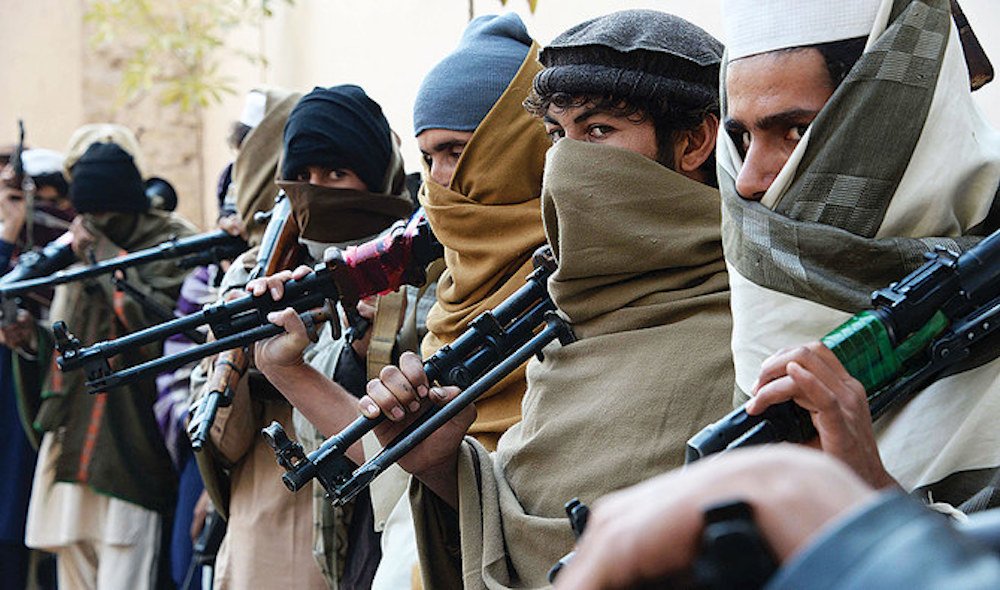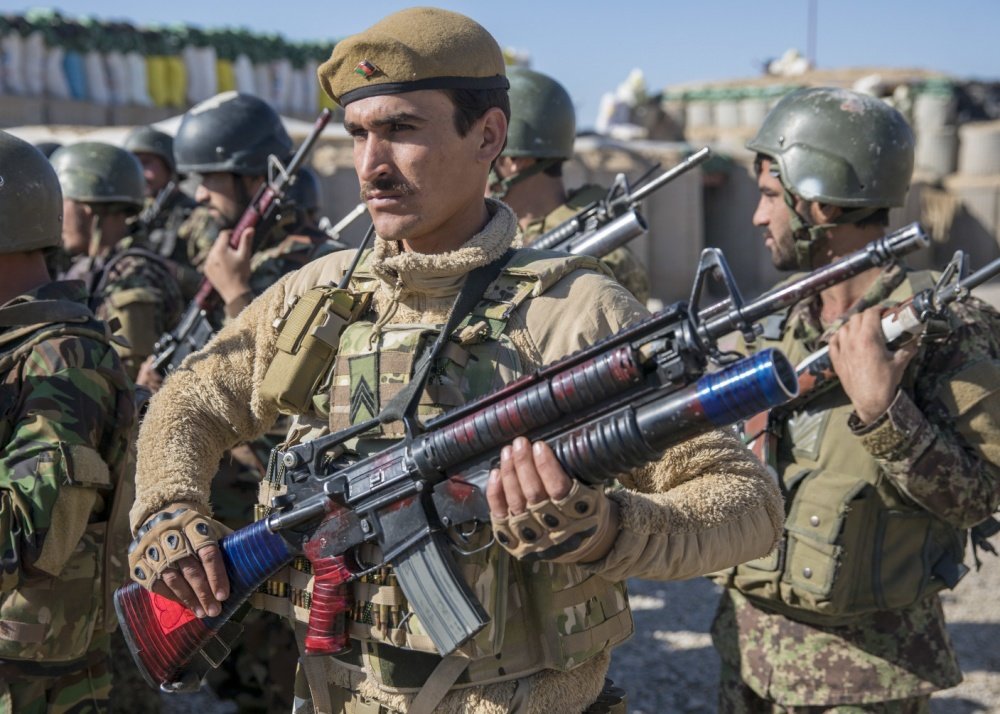
Former Afghan Taliban fighters are photographed holding weapons before handing them over as part of a government peace and reconciliation process at a ceremony in Jalalabad, Afghanistan, Feb. 8, 2015. Photo by Noorullah Shirzada/AFP, courtesy of Twitter.
This article was originally published March 15, 2021, by Radio Free Europe/Radio Liberty.
The Taliban says it will attend a high-level Afghan peace conference to be hosted by Russia on March 18.
The 10-member delegation will be led by Mullah Baradar, the group’s deputy leader and chief negotiator at U.S.-brokered talks in Qatar, Taliban spokesman Muhammad Naeem said in a statement on March 15.
The Afghan government has already confirmed its participation.
Invitations were extended to the Afghan government, political leaders, the Taliban, and representatives from the United States, China, and Pakistan. It was unclear whether the United States would attend.
The Moscow conference comes as the administration of U.S. President Joe Biden is stepping up efforts to accelerate the Afghan peace process ahead of a May 1 deadline for U.S. troops to withdraw from Afghanistan.
That deadline is part of a deal between the Taliban and the previous U.S. administration of President Donald Trump.

However, Biden’s administration has been reviewing the deal amid continued Taliban attacks in Afghanistan.
The Biden administration has proposed a senior-level meeting between the Taliban and Afghan politicians in Turkey in April, suggesting there should be heavy involvement by representatives of the United Nations.
The Afghan government has said it would take part in that conference. But the Taliban has not yet confirmed whether it would attend.
The U.S. special envoy for Afghanistan Zalmay Khalilzad met in Kabul with Afghan President Ashraf Ghani on March 15.
A spokesman for Ghani said Khalilzad had updated the Afghan president on his recent diplomatic trips to Pakistan and to Qatar, where peace talks between the Taliban and Afghan government representatives began in September 2020.
The talks in Doha have stalled in recent months, with no tangible progress.
Meanwhile, Taliban attacks and other militant violence has been increasing in Afghanistan.
Afghan police say a bomb targeting a minibus in Kabul wounded at least 15 civilians on March 15 — the latest in a surge of attacks in Kabul.
Ferdaws Faramarz, spokesman for the Kabul police chief, said the attack was in the Dahan-e-Bagh area of Kabul.
Faramarz said a nearby taxi also was damaged by the explosion and that the casualty count could rise.
The attack comes a day after bomb attacks on cars in the western part of Kabul killed three people and wounded 12, Faramarz said.
He said the first attack targeted a van and another vehicle was targeted in a different district. All the casualties were civilians, he said.
Copyright (c)2021 RFE/RL, Inc. Reprinted with the permission of Radio Free Europe/Radio Liberty, 1201 Connecticut Ave NW, Ste 400, Washington DC 20036.

Coffee or Die is Black Rifle Coffee Company’s online lifestyle magazine. Launched in June 2018, the magazine covers a variety of topics that generally focus on the people, places, or things that are interesting, entertaining, or informative to America’s coffee drinkers — often going to dangerous or austere locations to report those stories.
BRCC and Bad Moon Print Press team up for an exclusive, limited-edition T-shirt design!
BRCC partners with Team Room Design for an exclusive T-shirt release!
Thirty Seconds Out has partnered with BRCC for an exclusive shirt design invoking the God of Winter.
Lucas O'Hara of Grizzly Forge has teamed up with BRCC for a badass, exclusive Shirt Club T-shirt design featuring his most popular knife and tiomahawk.
Coffee or Die sits down with one of the graphic designers behind Black Rifle Coffee's signature look and vibe.
Biden will award the Medal of Honor to a Vietnam War Army helicopter pilot who risked his life to save a reconnaissance team from almost certain death.
Ever wonder how much Jack Mandaville would f*ck sh*t up if he went back in time? The American Revolution didn't even see him coming.
A nearly 200-year-old West Point time capsule that at first appeared to yield little more than dust contains hidden treasure, the US Military Academy said.












